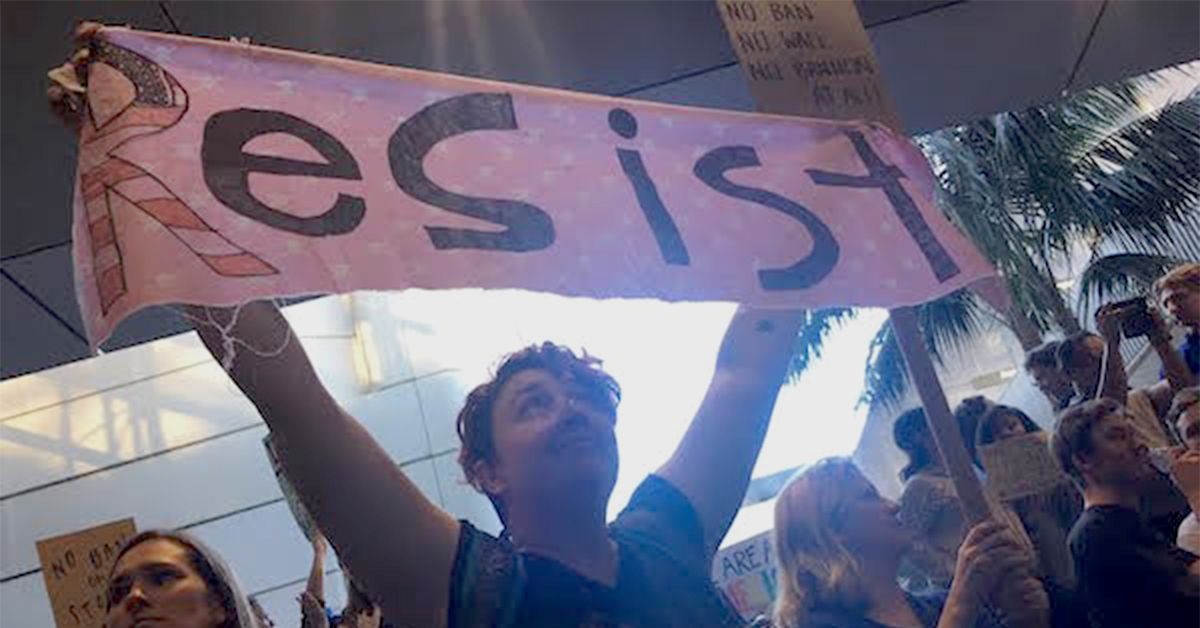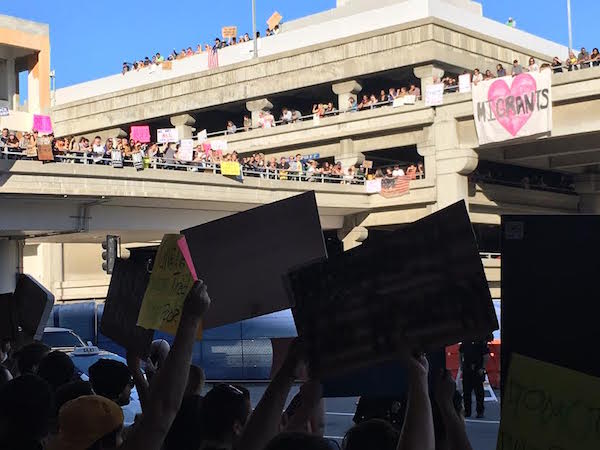Thousands of Los Angeles-area residents angry over a sweeping travel ban signed by President Donald Trump converged at Los Angeles International Airport on 29 January 2017 to demonstrate against it, even as advocates said they still did not know how many people were being held by immigration agents.
As demonstrators chanted and sang patriotic songs inside and outside the Tom Bradley International Terminal, Angelica Salas, executive director for the Coalition for Humane Immigrant Rights of Los Angeles (CHIRLA) told us that advocates had successfully petitioned for a court order for the return of a 70-year-old legal permanent resident, Ali Vayeghan, who had arrived at LAX but was deported. Salas said she doesn't know where Vayeghan is or how many people were being held or had been deported by customs agents as of 29 January 2017.
They're not giving any information. We are demanding that they have access to [legal] counsel and be allowed to use their cell phones to contact family... We don't know how many are being held, we don't know how many have been deported.
Salas and numerous immigration attorneys were waiting at the terminal to provide aid to people who had been detained as a result of the order, as thousands of peaceful but enthusiastic demonstrators held signs aloft that said things like "Obey the stay" and "God is love. No ban." Across the street, a small group of Trump supporters were separated from demonstrators by Los Angeles police officers.
But uncertainty hung in the air as attorneys and others ready to assist people sat waiting, surrounded by chanting protesters. The night before, on 28 January 2017, United States Representatives Judy Chu and Nanette Barragán, along with L.A. City Attorney Mike Feuer were unable to get any information from customs officials. Adding to the confusion, the Department of Homeland Security on 29 January 2017 released a statement saying that federal officials would continue to enforce the executive order, despite courts' ruling in favor of individuals affected. Salas said she believed that the cases would get class certification:
The executive order was signed on the evening of 27 January 2017 and placed a 120-day ban on entry for all refugees, barred Syrian refugees indefinitely and blocked for 90 days entry of citizens from seven predominantly-Muslim countries: Iran, Iraq, Libya, Somalia, Sudan, Syria and Yemen. On 29 January 2017, the President pushed back on criticism, saying the action was needed to keep the country safe and that characterizations of the order as a "Muslim ban" were false:
America is a proud nation of immigrants and we will continue to show compassion to those fleeing oppression, but we will do so while protecting our own citizens and border. America has always been the land of the free and home of the brave. We will keep it free and keep it safe, as the media knows, but refuses to say. My policy is similar to what President Obama did in 2011 when he banned visas for refugees from Iraq for six months. The seven countries named in the Executive Order are the same countries previously identified by the Obama administration as sources of terror. To be clear, this is not a Muslim ban, as the media is falsely reporting. This is not about religion — this is about terror and keeping our country safe. There are over 40 different countries worldwide that are majority Muslim that are not affected by this order. We will again be issuing visas to all countries once we are sure we have reviewed and implemented the most secure policies over the next 90 days. I have tremendous feeling for the people involved in this horrific humanitarian crisis in Syria. My first priority will always be to protect and serve our country, but as President I will find ways to help all those who are suffering.
However the executive order has been criticized for the chaos it has created by stranding green card holders, students and other visitors, sending some back overseas once they arrived state-side. Salas said Vayeghan's son is a U.S. citizen and that the executive order violates their rights — a claim supported by the court order she held in her hand. She cautioned that the executive order contains language that would allow the travel ban to be extended to other countries:
The Secretary of Homeland Security, in consultation with the Secretary of State, shall submit to the President a list of countries recommended for inclusion on a Presidential proclamation that would prohibit the entry of foreign nationals.Demonstrators meanwhile came out in droves at airports in major cities all over the country to express anger over it.
Demonstrations continued over the weekend at airports in major cities all over the country, from New York to Washington, D.C. to Philadelphia to Seattle to Los Angeles. Graduate student Thuan Nguyen told us he felt others should get to have the same ability to settle into a new life of opportunity in the U.S. that he did: ""I was an immigrant in 1993. I just wanted to show support and solidarity to future refugees and immigrants, to give them a chance."

